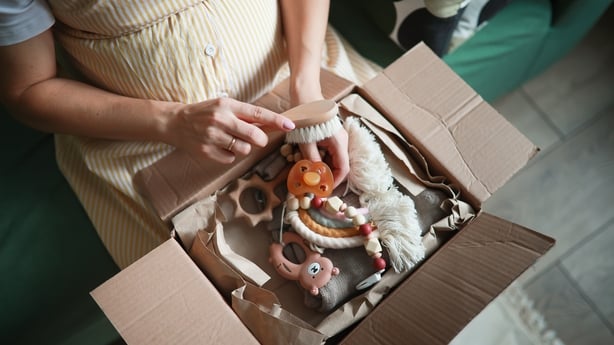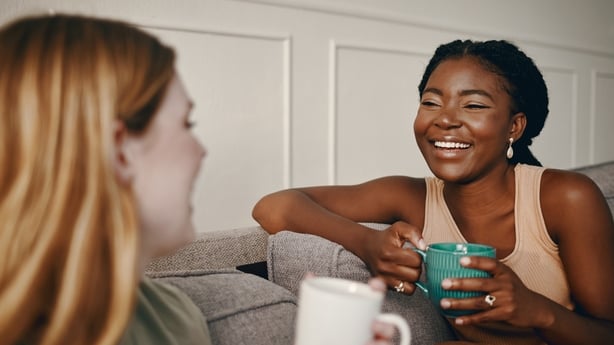When Clara McCormack was living in Australia with her two young children, she would look forward to the packages of secondhand baby clothes, shipped by her sister across the world.
Being the youngest in her family, she jokes that she was used to hand-me-downs herself, but the link to home was especially sacred to her then.
With two young sons, aged one and two by the time they moved back to Ireland, it was the continuation of a practice her family had started years earlier, when her mum would bring them to donate clothes to a women's shelter in Rathmines.
In this way, like many mothers, Clara got used to the idea of passing on expensive baby clothes once they weren't needed.
By the time she moved back to Ireland after 12 years abroad, she was looking for a similar opportunity. Before long, her sister had found Let's Match Mums, a grassroots organisation that paired mothers with other mums in Direct Provision, pairing them based on location and the age of their kids so that a constant supply of baby goods can be passed on.
Louisamay Hanrahan started the group during the pandemic as a way of spreading stories about the refugee experience in Ireland. Then called Let's Help, it documented life in Direct Provision, where many asylum seekers are living in hotels or hostels converted into state-provided accommodation and subsisting on a weekly payment of €38.80 per adult and €29.80 per child.
By visiting centres, Hanrahan soon noticed the needs of the mothers there for clothes, nappies and formula, among other things.
The group slowly transformed into what Hanrahan calls "Tinder for mums".
"A lot of refugees are mainly mothers that are without the father present and they're with their young kids", she explains. "If you're talking to a refugee and asking them, what are your problems? It's constantly stuff around their kids. They can't feed the kids the food that they want to feed them. They're out of formula, they need nappies.

Hanrahan also saw the profound overconsumption of baby goods that many parents unwittingly end up in, with friends and family gifting huge quantities of items, or parents feeling pushed to buy more than they actually need.
"A lot of the time when it's your first kid, you're told you need X-Y-Z and you actually only need x and you never use y and z", she says. "It's brand new stuff that's just never really been used because it just didn't work for that specific child and that parent."
Let's Match Mums creates a channel for that waste by matching local mums with mums in Direct Provision who have children aged between six months to a year younger than the local mum.
"So that means that as their kid grows, they always have a new, let's say they've grown out of their one year old clothes. They can text a refugee mum and be like, hey, I have this stuff now if you're interested. So it means these matches go on like a couple of years."
Zibusiso Lunga is one such mum using the service, and now also volunteering with Let's Match Mums. When she arrived from Zimbabwe to Ireland in October 2022, with her 15-month-old son, she no clothes for either of them.
"It was a very challenging time", she recalls. "It was cold by then. You had to have warm things for the child and it was a very difficult time for them."
After one meeting with a local mum, that changed. "She brought everything that I needed by that time. And if there's anything I want, [she said] I should just give her a ring."
3 years on we are still averaging over 100 mum matches a week 😍
— Letsmatchmums (@letsmatchmums) August 29, 2023
"That's how I got to open up and meet moms", she says. "And every time they'll just come and drop stuff for me, there will be chitchat."
Coming through the experience of fleeing her home country and the turmoil and change that brings, the service also allowed Lunga a space to talk and be supported by other mums. "I was going through stuff and I had to share with some of the moms and it made things easier for me", she says.
Hanrahan says that's just one example of lasting connections created by the mums involved, with one match lasting three years already. While there have been some calls to include dads in the matches - and Hanrahan does feel some "guilt" for encouraging the assumption that it's just the mums who manage their children's needs - she is focused on maintaining the "trust" between just mothers.
She sees parallels in the isolation sometimes felt by both local and refugee mums. "Motherhood is a lonely time anyway. It's very common for Irish moms and local moms to experience isolation. Once you have a kid, no longer are you on the same kind of schedule as your friend group and you're living a completely different life."

As for refugee mums, they're in a particularly insular community, and miles away from their relatives and supports at home. "If they want to meet someone, they might know the people within the direct provision centre but not know many other people outside of it. So being able to connect with another mum gives them an opportunity to create friendships.
"We'd have local moms that help their refugee mum with figuring out how to get set up in a new school or how to navigate the house rental system, stuff like that. Just being able to have a contact that's in the local community you're in. That's really helpful."
Speaking about her own match, McCormack says: "We're both mums with young boys and experiencing the same things.
"Even though our lives are probably quite different and it is hard seeing the small hotel or the big hotel, but in the outskirts, and it must be very difficult as a kind of day-to-day way of living, but at the same time, I guess maybe having an encounter that's donating and mindful of that is a positive thing."


